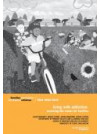This report explores and exposes issues that have arisen for New Zealand family members as they have supported a family member through an alcohol and/or other drug addiction problem. It builds upon a growing body of knowledge within national and international literature about the impact of addiction problems on families.
For the purpose of this project, ‘family’ of an individual is defined as the collective group of people who hold the greatest interest in that individual’s welfare.
Erratum: On page 48 of this report it incorrectly states that Porirua City Council operates the Taeaomanino Trust. The Taeaomanino Trust is a separate entity.
Purpose
The project was designed to address the following specific research questions:
- What are the key issues for families living with addiction? Do the issues facing New Zealand families differ if there is a drug use, compared to an alcohol problem? If so, how does illicit drug use influence the issues, compared to alcohol?
- What are the particular barriers that New Zealand families encounter when trying to help a family member with a drug problem, alcohol problem or problem with both?
- What are the barriers and incentives for family members to seek and gain help for themselves?
- What are the resilience factors for families (rather than for individuals)?
- How do the characteristics of support services contribute to the family experiences?
Methodology
Ethical approval for this project was obtained from the Central Regional Ethics Committee. This project represents the voices and wisdom of many contributors, identified in the report as Key Stakeholders, Family Participants and Informal Informants.
Potential Key Stakeholders were identified from a variety of services and contacted about the planned research. Approximately 50 Key Stakeholders gave their insights into: how families become aware of an addiction problem, main impacts on families, substance-specific issues for families, how family needs change over time, how services currently respond and their view of the ideal service. A total of 10 formal Key Stakeholder interviews were recorded and transcribed, with consent. Others contributed their thoughts and comments by email, by telephone and face-to-face discussion.
Family Participants were adult members of families affected by addiction (aged 18 years or over), recruited through health and social services. Family Participants signed a consent form and undertook a recorded interview with consent for transcription for further analysis. Interviews were held in person or by phone (according to the preference of the family member).
Family Participant interviews were conducted in greater Wellington and in Christchurch. A total of 19 Family Participants were interviewed and they provided insights into: becoming aware, impacts on families, substance-specific considerations, time and resilience, help for the addicted individual and help for the families.
Informal Informants were people who had heard about the research and wanted to share their perspectives and contribute their wisdom and insights into New Zealand families living with addiction. These ad hoc informants contributed to the project in a less formal manner, giving advice and opinion, and were not consented as research participants or formally interviewed. Overall there were well over 100 Informal Informants to this project, including delegates at various consultation meetings. Informal Informants contributed their insights to assist with clarity and interpretation of findings.
Findings from review of the literature and Key Stakeholders informed the development of an interview schedule used with the Family Participants. Informal Informants provided additional information for clarification and validation of the findings.
In keeping with a grounded iterative research process, interview questions evolved over time, particularly as new information was gathered, and subsequent interviews were informed by issues raised in earlier interviews.
The analysis is described in detail in the Methods section of the main report. In brief, this was a qualitative study utilising principles of naturalistic enquiry through iterative semi-structured interviews. Analysis sought to identify key themes and/or critical elements that underpinned those themes. The research team members each brought different perspectives and skills (from psychology, sociolinguistics, primary care and addiction medicine backgrounds) to the analysis. In addition, an in-depth analysis was undertaken on a few selected transcripts (it was beyond the scope of the study to conduct this on all interviews) to provide further insight into the underlying meaning in the way that participants described their experiences. In particular, the analysis looked for verbal cues to the emotion within the interactions. These findings assisted in overall interpretation, helping to address the research questions, and served to pilot the scope of an additional methodology for future analysis.
Key Stakeholders and Informal Informants were consulted on the draft report to discuss findings and interpretation. In particular, the opportunity was taken to present preliminary findings to a research audience to seek feedback at a primary care research forum.

